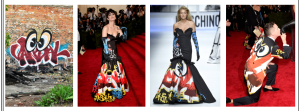McDonald’s recently prevailed on personal jurisdiction grounds in a closely-watched case in California about the use of street art as décor for restaurants in the United Kingdom, but the issue has quickly arisen again. As part of what the fast-food giant has clearly decided is a winning branding strategy, the chain’s use of graffiti from New York has now brought the threat of litigation from the so-called Bushwick Collective. Where any such lawsuit gets filed will have a great deal to do with what happens next.
McDonald's Beats Graffiti Copyright Claims in California, But Faces New Threat over New York Street Art
Topics: Joseph Tierney, Netherlands, Digital Millennium Copyright Act, Rime, California, specific jurisdiction, 17 U.S.C. § 1202, general jurisdiction, Moschino, personal jurisdiction, Graffiti, New York, Dashiell Snow, McDonald's, Street Art, Daimler AG v. Bauman, Virus, NDA, Don Rimx, Beau Stanton, Himbad, United Kingdom, Atomik, Bushwick Collective
Is Coopting Graffiti Artist's Street Cred a Fair Use?
Estate of Graffiti Artist Sues McDonald’s Over Fast-Food Décor
The estate of Dashiell “Dash” Snow, better known as graffiti artist “Secret Snow”—has sued McDonald’s over allegedly infringing use of Snow’s street art in McDonald’s dining rooms. The lawsuit in the Central District of California is the latest in a series of cases in which street artists are asserting their rights in copyright without any concession about whether the creation has other legal issues (i.e., trespassing or vandalism). Based on the survival of other recent similar cases, this latest case could be a headache for the giant restaurant chain, though it may have interesting fair use arguments based on the contrasting nature of the street vs. corporate uses.
Topics: Digital Millennium Copyright Act, Rime, Graffiti Art, 17 U.S.C. § 1202, Moschino, Dashiell Snow, Street Cred, McDonald's
Graffiti on the Runway: Street Artist Rime Pursues Lawsuit Against Moschino for Damaging His Street Cred
The fusion of street art, high fashion, and the law is hardly new, but the Italian designer Moschino’s latest foray into this genre has landed the company in court. Joseph Tierney, a well known graffiti artist who works under the pseudonym “Rime”, filed a complaint against Moschino and its creative director, Jeremy Scott, alleging copyright infringement, trademark violations under the Lanham Act, and unfair competition, and appropriation of name and likeness under California law. Moschino’s allegedly unauthorized use of his work has harmed the artist in numerous ways, Tierney alleges, not the least by opening him up to accusations of selling out. In the words of Tierney’s complaint: “nothing is more antithetical to the outsider ‘street cred’ that is essential to graffiti artists than association with European chic, luxury and glamour – of which Moschino is the epitome.” This theory of harm was something we talked about at the "Copyrights on the Street" panel at the Copyright Society of the USA meeting in Newport this year, and it is now being put to the test.
Topics: Joseph Tierney, copyright management information, Vandal Eyes, Digital Millennium Copyright Act, Rime, The Wall Street Journal, Graffiti Art, 17 U.S.C. § 1202, Gigi Hadid, Hollywood Reporter, Jeremy Scott, Copyright, Moschino, Lanham Act, The New York Times





